 Petzlover
Petzlover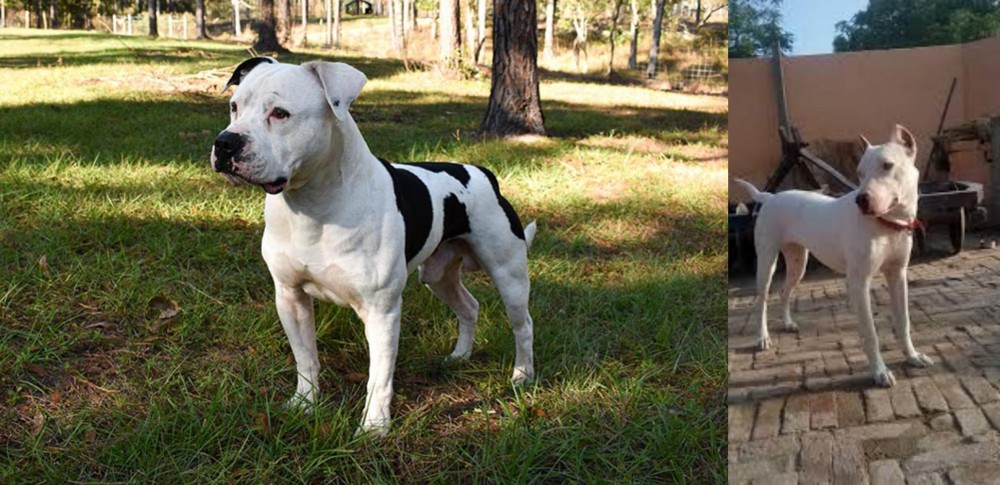 American Bulldog is originated from United States but Indian Bull Terrier is originated from United Kingdom. American Bulldog may grow 14 cm / 6 inches higher than Indian Bull Terrier. American Bulldog may weigh 24 kg / 53 pounds more than Indian Bull Terrier. Both American Bulldog and Indian Bull Terrier has almost same life span. American Bulldog may have more litter size than Indian Bull Terrier. Both American Bulldog and Indian Bull Terrier requires Low Maintenance.
American Bulldog is originated from United States but Indian Bull Terrier is originated from United Kingdom. American Bulldog may grow 14 cm / 6 inches higher than Indian Bull Terrier. American Bulldog may weigh 24 kg / 53 pounds more than Indian Bull Terrier. Both American Bulldog and Indian Bull Terrier has almost same life span. American Bulldog may have more litter size than Indian Bull Terrier. Both American Bulldog and Indian Bull Terrier requires Low Maintenance.
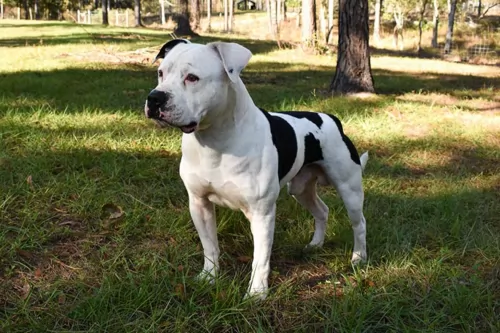 Following World War II, the American Bulldog was almost extinct.
Following World War II, the American Bulldog was almost extinct.
Thanks to John D. Johnson from Summerville, Georgia the breed is still with us today. He gathered the best dogs he could find throughout the rural South and bred them back into popularity among his family and other rural families. His father bred the American Bulldog before John did and they have bred them longer than any other in any part of the world. His dogs were regularly used for tracking, hunting, guarding, watchdog and weight pulling. At some point Alan Scott joined Johnson breeding other bulldogs to Johnson's and forming the Standard American Bulldog.
The American Bulldog/ is popular today as a family pet and companion as well as a working dog.
 Not much is known of the dog breed crossings that James Hinks carried out to get the Indian Bull Terrier. It is believed that he used the old English Bulldog, the English White Terrier and even the Dalmatian and Greyhound.
Not much is known of the dog breed crossings that James Hinks carried out to get the Indian Bull Terrier. It is believed that he used the old English Bulldog, the English White Terrier and even the Dalmatian and Greyhound.
The dog comes from the UK but was later introduced to India. The Indian Bull Terrier, known as the Indian gladiator was introduced to India by the British Colonial Forces. The dog was developed from British dogs, namely Irish and English strains of the Staffordshire Bull Terrier, the original English White Terrier and the Hinks Bullterrier breed. The legacy of Hinks is known worldwide – he is known as the one who mixed white terriers to bull dogs to make bull terriers. He made a breed that was the base breed of the egg shaped head bull terriers we see today.
The dog is similar in looks to the old type English Bullterrier. The dog has always been valued as a fighter and as a watchdog.
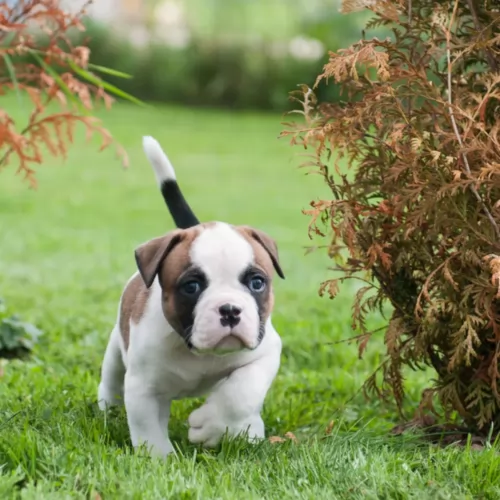 The American Bulldog is a powerful and muscular dog in a sturdy and compact frame. The female is more refined than the heavy boned and stocky male, but both genders are athletic, agile and quick. The have large heads, strong jaws, a muscular neck and with a moderately deep and wide chest.
The American Bulldog is a powerful and muscular dog in a sturdy and compact frame. The female is more refined than the heavy boned and stocky male, but both genders are athletic, agile and quick. The have large heads, strong jaws, a muscular neck and with a moderately deep and wide chest.
They have a square head, with muscular cheeks and a clearly defined furrow between his eyes. With broad, square and strong muzzles, they have a reverse scissors, scissors, moderate underbite and an even bite. Ears come in a variety of shapes and sizes and eyes can be any color as well. The nose however should be black and lips black as well. Their legs are strong, heavy boned and straight with well-defined muscles in the hindquarters. Finally ,they have a thick, low set tail that comes to a point at the end.
 The Indian Bully is a powerful, muscular, athletic and aggressive breed. He is a medium sized dog standing at roughly 46 cm to 56cm and weighs in the region of 20 – 30kg, both male and female.
The Indian Bully is a powerful, muscular, athletic and aggressive breed. He is a medium sized dog standing at roughly 46 cm to 56cm and weighs in the region of 20 – 30kg, both male and female.
As a Molosser, he has a strong, lean body with fairly long legs. Because of the white coat, quite a lot of them are born deaf and they also have skin allergies. The coat of the Indian Bull Terrier is short and smooth and nearly always white although you may well find some small dark markings on the coat. While solid white is the more common color, tan, red-brown and brindle can also be seen. He has the traditional egg-shaped head, erect ears, slanted eyes and long tail.
Your robust Indian Bull Terrier is a fearless dog, and where he has always been used for fighting in India and Pakistan, they are seeing the value of owning him as a pet too.
He is a loving, devoted pet, regarded as a bit of a clown. He is active and intelligent and apart from him wanting a lot of exercise, he just loves being with his human family, being involved with their hike, walks, ball games and swimming.
Being such a robust, active breed, he isn't suited to life in the city where the home is tiny and with little space to run. He is also strong-willed and maybe this characteristic of his might prove to be a bit of a handful for the first time dog owner.
He will need to receive early training and socialization, more so when there are children in the home. He can be inclined towards aggressiveness. They are capable of bonding with kids in the home but they can lean towards aggressiveness with other children.
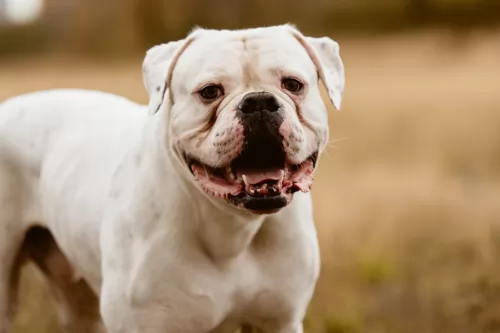 The American Bulldog is characteristically loyal, brave and reliable. It is a friendly, gentle dog that truly loves children. There is not a hostile bone in his body despite his history and reputation for bull baiting. Though he is protective of its family and affectionate with most, he still needs a human companion who is strong willed and a genuine pack leader. Without this he might become aggressive around other dogs and pets. They are immensely self-confident and they do slobber and drool and will become excited and hard to handle without daily exercise of both their body and their minds.
The American Bulldog is characteristically loyal, brave and reliable. It is a friendly, gentle dog that truly loves children. There is not a hostile bone in his body despite his history and reputation for bull baiting. Though he is protective of its family and affectionate with most, he still needs a human companion who is strong willed and a genuine pack leader. Without this he might become aggressive around other dogs and pets. They are immensely self-confident and they do slobber and drool and will become excited and hard to handle without daily exercise of both their body and their minds.
 Indian Bull Terriers are affectionate, playful 4-legged family members. They are loyal, protective and social and will get on well with their own human family members but not necessarily with strangers.
Indian Bull Terriers are affectionate, playful 4-legged family members. They are loyal, protective and social and will get on well with their own human family members but not necessarily with strangers.
Precautions need to be taken around visitors who aren't familiar with the dog. He is powerful and energetic and must be trained and socialized to become the obedient, loving, loyal pet he is known to be.
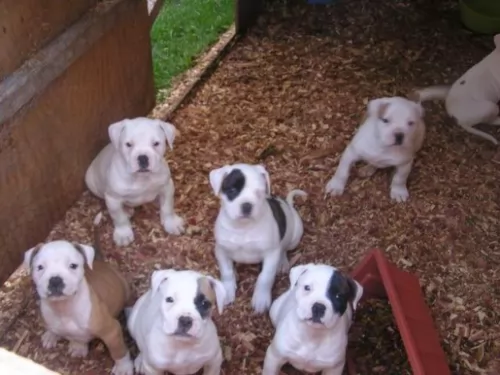 Though generally healthy, the American Bulldog is prone to a few problems.
Though generally healthy, the American Bulldog is prone to a few problems.
This is a serious issue in many breeds of dogs and is especially prevalent with the American Bull Dog. This may seem ironic in such a short legged dog but it is unfortunately very common. It is a genetic disorder that causes the bones in the joint to separate and causes the dog much pain and lameness.
Due to skin folds you need to be care and watch for irritation and infection in the folds. They are also prone to ear infections.
The American Bulldog is prone to overeating and all the health issues that presents. With short legs and a genetic predisposition to arthritis and hip dysplasia, obesity is a real health risk for your bulldog.
 With love and good care, your Indian Bull Terrier can reach up to 14 years of age and even more.
With love and good care, your Indian Bull Terrier can reach up to 14 years of age and even more.
If you own the white Indian Bull Terrier, you need to keep in mind that deafness is found in many white dogs. Another concern for your white dog is sun protection. Whether white or one of the other shades, your dog has short, sparse hair and spending hours in the sun can be hazardous to him and he can suffer with serious sunburn. Serious sunburn can lead to other complications such as cancer.
 Your Indian Bull Terrier has a short coat and he doesn't thrive in cold, damp weather. When its really cold, keep him indoors or put a sweater on when he needs to go outdoors.
Your Indian Bull Terrier has a short coat and he doesn't thrive in cold, damp weather. When its really cold, keep him indoors or put a sweater on when he needs to go outdoors.
Give him a nice, warm, dry place to sleep and ensure that if he goes outside, there is both sun and shady spots for him to lie.
This is a low maintenance dog, so a twice-weekly brush will do him the world of good. It will get rid of loose hair, he will love the closeness the brushing provides and the brushing will keep his coat shiny and healthy.
If you have a white Indian Bull Terrier, if he has dirty marks on his coat, you can just wipe him down with a damp cloth.
Remember to do regular checks on his ears and teeth too. Tooth decay can bring on a host of illnesses for your pet.
If you are going to be giving your pet commercially manufactured dog food, make sure its the best there is.
Your Indian Bull Terrier is an active dog and you want to make sure that he remains healthy and active for the 10 to 14 years that he is with you. If you're unsure as to how to feed your pet, speak to your vet.
It will always be to your pets benefit to feed him some homemade food too and cooked chicken, brown rice and pasta and vegetables will keep his eyes bright and alert. If you can, try to add in some raw meat into his kibble too as this helps to keep his skin healthy. Never ever leave him without a constant supply of fresh, cool water.